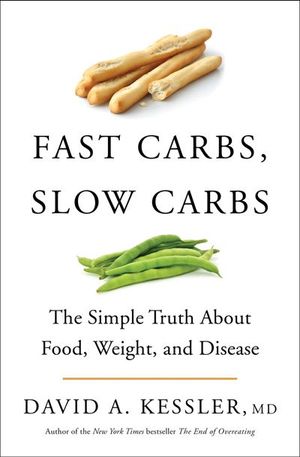Fast Carbs, Slow Carbs
Published by HarperCollins
The New York Times–bestselling author of The End of Overeating addresses the problem of processed carbohydrates—and how to reclaim our metabolic health.
It was once a revolutionary idea that seemed to offer so much promise. Instead has become the cause of a global health crisis: processed foods.
Starting in the mid-twentieth century, processed carbohydrates gradually became our main food source. For decades, no one questioned their effects. The focus was on fertile grassland, ideal for growing vast amounts of wheat and corn; an industrial infrastructure perfect for refining those grains into starch; a food production behemoth that turns refined grains into affordable, appealing, and ever-present food items, from pizza to burritos to bagels; and an efficient distribution network that ensures consumption by Americans nationwide. Meanwhile, our bodies quietly contended with the metabolic chaos caused by consuming rapidly absorbable starch. Slowly but surely, these effects accumulated and became disastrous, leading to the public health crisis in which we find ourselves today.
In Fast Carbs, Slow Carbs, former FDA Commissioner David A. Kessler explains how the quest to feed a nation resulted in a population that is increasingly suffering from obesity and chronic disease. He explains how eating refined grains leads to a cascade of hormonal and metabolic issues that make it very easy to gain weight—and nearly impossible to lose it. Worse still is how excess weight creates a very real link to diabetes, heart disease, cognitive decline, and a host of cancers.
We can no longer afford to dismiss the consequences of eating food designed to be rapidly absorbed as sugar in our bodies. Informed by cutting-edge research as well as Dr. Kessler’s own quest to manage his weight, Fast Carbs, Slow Carbs reveals how we got to this critical turning point in our health as a nation—and outlines a plan for eliminating heart disease.
It was once a revolutionary idea that seemed to offer so much promise. Instead has become the cause of a global health crisis: processed foods.
Starting in the mid-twentieth century, processed carbohydrates gradually became our main food source. For decades, no one questioned their effects. The focus was on fertile grassland, ideal for growing vast amounts of wheat and corn; an industrial infrastructure perfect for refining those grains into starch; a food production behemoth that turns refined grains into affordable, appealing, and ever-present food items, from pizza to burritos to bagels; and an efficient distribution network that ensures consumption by Americans nationwide. Meanwhile, our bodies quietly contended with the metabolic chaos caused by consuming rapidly absorbable starch. Slowly but surely, these effects accumulated and became disastrous, leading to the public health crisis in which we find ourselves today.
In Fast Carbs, Slow Carbs, former FDA Commissioner David A. Kessler explains how the quest to feed a nation resulted in a population that is increasingly suffering from obesity and chronic disease. He explains how eating refined grains leads to a cascade of hormonal and metabolic issues that make it very easy to gain weight—and nearly impossible to lose it. Worse still is how excess weight creates a very real link to diabetes, heart disease, cognitive decline, and a host of cancers.
We can no longer afford to dismiss the consequences of eating food designed to be rapidly absorbed as sugar in our bodies. Informed by cutting-edge research as well as Dr. Kessler’s own quest to manage his weight, Fast Carbs, Slow Carbs reveals how we got to this critical turning point in our health as a nation—and outlines a plan for eliminating heart disease.
BUY NOW FROM
COMMUNITY REVIEWS
